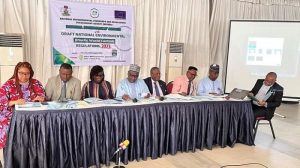The harm that plastic waste poses to environmental protection and human health continues to hinder Nigeria’s socioeconomic development. Etta Michael Bisong, who attended the final meeting where the draft National Environmental Plastic Waste Control Regulations (2023) was decided, examines stakeholders’ perspectives on how this menace can be tackled

Plastic waste has become a terrifying issue, and the entire world is concerned about how to use and manage it. Nigeria, as an oil and gas country, is especially vulnerable to the negative impacts of these toxic compounds due to the availability of the resources required for their production.
Nigeria’s per capita plastic use was estimated to be 7.5 kg in 2020 and will likely increase by 5-7 percent annually. With an estimated 55 percent of total use, packaging materials have been the largest consumer of plastic, followed by the construction, automotive, and power industries.
The unpleasant side of this problem is that many Nigerians regard plastic debris as ordinary, which is quite bad because these dangerous compounds end up injuring people when they reach the ecosystem.
Another concerning aspect of the situation is the forecast that the amount of plastic that will be found in oceans will outnumber the number of fish by 2030 if nothing is done quickly to address this unrest.
Several factors have been highlighted as the fundamental causes of this poor practice, including a lack of a good regulatory framework and a lack of proper public knowledge of the dangers of plastics.
As a result, according to Prof. Babajide Alao, the event’s chairman, the draft regulations are designed to assist significant actors in reducing plastic pollution in the country.
With the new standards in place, he explained, Nigeria can now be proud of a system that would support addressing the million metric tonnes of plastic found on the streets, in landfills, gutters, and water bodies.
The endorsed regulations, according to Prof. Aliyu Jauro, director general of the National Environmental Standards and Regulations Enforcement Agency (NESREA), represent an effort by the federal government to provide the necessary means to carry out the government’s Plastic Waste Management Policy, which was ratified by the Federal Executive Council (FEC) in 2020.
He asserts that plastics will unquestionably be required to enhance the socioeconomic development of the nation. But he insisted that they could be used more sustainably than they are now.
“Yes, it will be difficult to do without plastics,” he admitted, “but let us do it sustainably.”
In a similar vein, Dr. Leslie Adogame, executive director of Sustainable Research and Action for Environmental Development (SRADev), stated that the new guidelines will help promote plastic waste management while taking its lifecycle into account in a sustainable manner.
“It will prevent single-use plastics, packaging, and waste materials from being dumped in the environment and cut plastic waste production by 50% by 2025,” he said.
According to him, there is an urgent need to minimise plastics in order to address the issue of global warming and greenhouse gas emissions caused by plastic production by 2030.
Assuring the attendees of the government’s commitment to economic development through sustainable plastic usage, Minister of State for the Environment Dr. Ishaq Salako explained to them that the policy is intended to help address the problem of the nation’s careless plastic use.
The minister, represented by Dr. Amadu Jubrin, noted that the document would assist in the reduction of plastic pollution and the establishment of infrastructure to boost waste management efficiency.
“We will reap the benefits of plastic waste control,” he said, citing its importance to economic development.
According to Godfrey Ogbemudia, a representative of the European Union (EU), the regulation was drafted through a comprehensive and dynamic process that included input from all relevant stakeholders from both the public and private sectors, including academics, practitioners, civil society organisations, women and youth, and the donor community.
To achieve its goal, he charged the government with conducting waste management enlightenment initiatives that would attract investors to develop recycling factories, thereby reducing the plastic crisis in Nigeria by half.
By Etta Michael Bisong, Abuja
